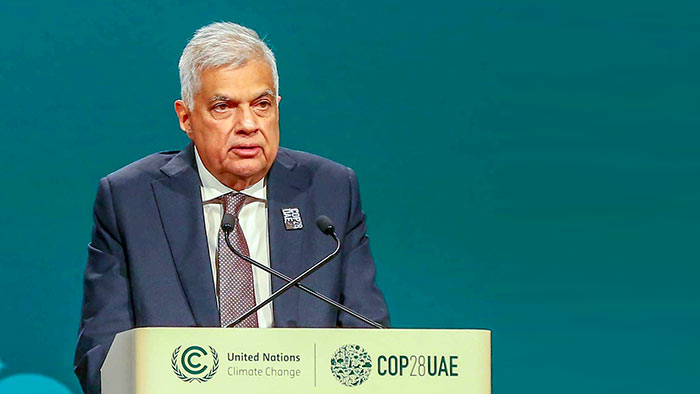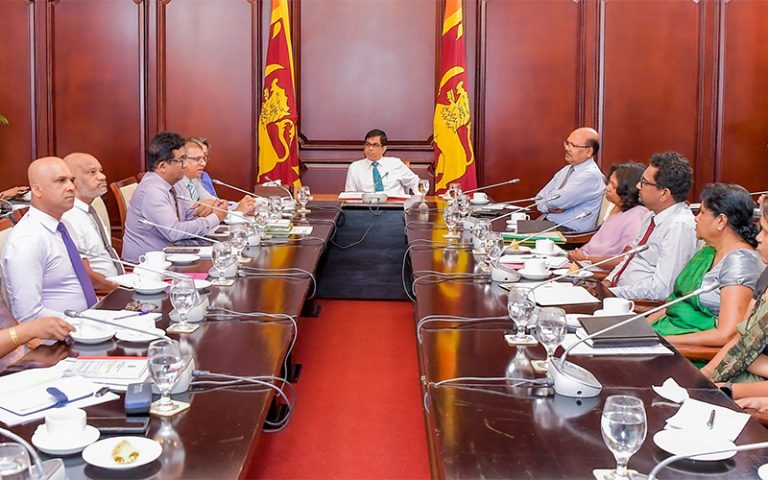In a powerful address at COP28, Sri Lanka’s President Ranil Wickremesinghe urged world leaders to take immediate and decisive action to address the escalating climate crisis. He highlighted the disproportionate impact of climate change on developing countries like Sri Lanka, emphasizing the need for global solidarity and climate justice.
President Wickremesinghe called for the establishment of a Climate Justice Forum to provide a platform for constructive dialogue and proactive engagement on climate issues. He also proposed a resolution for the forum to be moved at the UN Environment Assembly in February 2024.
The President emphasized the importance of investing in the Tropical Belt, home to 44% of the Earth’s surface and projected to be home to half the world’s population by the 2030s. He advocated for large-scale investments in renewable energy, pollution control, and nature-based solutions to mitigate climate change and enhance carbon sequestration.
Recognizing the crucial role of the Indian Ocean in climate change, President Wickremesinghe, as the current Chair of the Indian Ocean Rim Association (IORA), called for collective action to protect the Indian Ocean and its marine ecosystems. He emphasized the need for a sustainable, inclusive, and people-centered Blue Economy to secure the Indian Ocean for future generations.
Finally, President Wickremesinghe reiterated the need for an International Climate Change University (ICCU) to advance research and capacity building in climate change mitigation. He stressed the importance of transdisciplinary knowledge and collaboration to address the complex challenges posed by climate change.
President Wickremesinghe’s impassioned speech at COP28 serves as a stark reminder of the urgency of climate action. His call for global solidarity, climate justice, and investment in the Tropical Belt and the Indian Ocean offers a roadmap towards a sustainable future for all.
The full text of Sri Lanka President Wickremesinghe’s speech at the COP 28:
Mr. President
Excellencies
Esteemed Delegates
At the outset let me congratulate the Government of the United Arab Emirates for hosting COP28 and extend to you my gratitude for your warm hospitality.
It was in 1972 the world first focused on the environment -The UN Conference on Human Environment which enunciated the goal of defending and improving the environment for present and future generations.
50 years later, the Stockholm+50 Report concluded that limiting global warming to 1.5 degrees Celsius requires rapid and large-scale reduction of carbon emissions.
The UNEP Report of 2023 “Broken Promises” warned that we are facing a 3 degree Celcius increase in global temperatures by the end of the century.
We are already feeling the impact. Sri Lanka is experiencing a palpable rise in ambient temperature; continuous gray skies; heavy rains that are not seasonal; lightning and thunderstorms; and as a consequence, flooding of riverbanks and earth slips in the mountains.
Let me reiterate, each year, the costs of mitigating these recurring calamities in terms of lives, livelihoods, displacement destruction, rebuilding is an additional burden on our thinly-stretched economies.
Remember, the developing countries are both disproportionately vulnerable and disproportionately impacted – due to their lower adaptive capacity when it comes to investments in Finance, Technology and Climate.
The Independent High-Level Expert Group Report on Climate Finance highlighted that at least a US$ Trillion per annum is required to combat climate change.
At the last COP held in Egypt, we agreed to establish the “Loss and Damages Fund”.
However, the Transitional Committee on the Operationalisation of Funding Arrangements in its Report of 4th November 2023 only calls for voluntary contributions.
The Report makes no mention of the funds needed or who the contributors are. It is silent on the issue of global debt relief.
Nevertheless, four days later, the Technical Dialogue of the First Global Stocktake highlighted the requirements of a minimum of US$ trillion per annum. To arrive at a consensus not to take up a contentious issue is not a solution. Who are we fooling?
We are denied climate justice. In this background, Sri Lanka will propose a resolution for a Climate Justice Forum which was agreed upon at the 5th Forum of the Ministers of Environmental Authorities of Asia Pacific to be moved at the UN Environment Assembly of 6thFebruary 2024.
The Climate Justice Forum will provide us a platform for constructive and proactive engagements.
Since 1972, the Brussels Group has been fighting a rearguard action on climate change mitigation. This forum will give us an opportunity to address their genuine concerns.
To address the issue of ensuring that the tax payers monies are not wasted.
As the Secretary General of the UN said, “the era of global boiling has arrived”.
The enemy is at the gates. We are still procrastinating. We are still forming our battalions to take the fight to the enemy.
Therefore, this fortnight is critical.
It will determine whether we are capable of providing leadership to mitigate climate crisis or not. Sri Lanka is committed to the 1.5 degree Celcius limit.
We must act immediately to find effective solutions. We must think outside of the box. We must Invest in the Tropical Belt to tackle the Triple Planetary Crisis.
The Tropical Belt constitutes 134 countries covering 44% of earth’s surface, and will by 2030s be home to roughly 50% of world’s population.
Most of the world’s remaining primary forests are tropical, along with its coral reef systems.
The rich biodiversity of the Tropical Belt enhances biological carbon sequestration andcan shield the world from instabilities inweather.
Furthermore, the energy generation potential from solar, wind and biomass are significantly higher in the tropics than that of other areas on the earth.
Yet, anthropogenic activities
human activities that cause
pollution – in the Tropical Belt can easily lead to an imbalance in the equilibrium of this region.
So much so that some scientists predict that the Tropical Rain Belt could shift away from the Equator by the 22nd Century.
Large scale investments in Renewable Energy, Pollution Control and Nature-based Solutions. Eg. Protection, restoration and improved management of forests, wetlands, grasslands etc. will lead to significant transformative changes in the entire world by enhancing carbon sequestration.
Therefore, Sri Lanka and other concerned parties will convene a panel to report on the Tropical Belt Initiative.
A multi sector plan distributed not only among the whole tropical region but the whole world.
As the current Chair of the Indian Ocean Rim Association (IORA), Sri Lanka is focusing on the interdependence between the Indian Ocean and climate change.
A healthy ocean generates oxygen and absorbs the carbon and heat produced from global warming. Mangroves and seagrasses sink more carbon than land forests. However, rapid climate change is altering the marine environment with rising sea levels and temperatures, Ocean acidification, coral bleaching, habitat destruction and extreme weather patterns.
These phenomenon have a direct impact on human lives by disrupting ocean biodiversity, Ocean dependent food patterns, and coastal livelihoods.
Member states and partners of IORA will work towards ensuring a sustainable, inclusive and people-centered Blue Economy to secure the Indian Ocean for future generations.
The Tropical Belt and the Indian Ocean combined will form the largest global sink for carbon sequestration.
Addressing the climate change need, up to date scientific knowledge, and the effective use of these findings
Therefore, at COP27, I proposed to establish an International Climate Change University (ICCU) to
concentrate on post graduate studies – The ICCU objectives are capacity building and advancing research – necessary to contribute to the crucial efforts to limiting global warming to 1.5 degrees Celsius.
The ICCU will also serve as a futuristic “Centre for Excellence” in policy dialogue and advocacy on climate change.
The ICCU is critical for generating knowledge on the trans-disciplinary issues that is crucial for Climate Change Mitigation. i.e. for the survival of our planet.







